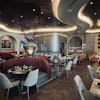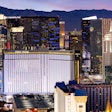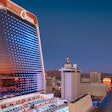Graduate student Heather Willden says she likes the "energy and excitement" of her chosen field of study, a relatively new alternative to long-popular majors like business administration or political science. Like a growing number of students at colleges and universities across the country, Willden is studying the field of special events.
As a candidate for a master's degree in hotel administration (with an emphasis on meetings and special events) at the University of Nevada, Las Vegas (UNLV), Willden says her classes are giving her "practical skills. I can take those and be better prepared and be a better professional."
Although event management has been offered as a formal course of study at a few colleges and universities across the United States for years, its popularity is growing significantly. First offered in academic institutions located in well-known tourist destinations—like New York University (NYU); Washington, D.C.'s George Washington University; and Las Vegas's UNLV—the subject is now being taught at institutions that might be considered somewhat off-the-beaten track, like Indiana University in Indianapolis.
Professors at most schools report rapidly growing interest in this subject among students, both at the undergraduate and graduate levels. "There's much more media awareness of what event planners do, on cable shows about weddings and parties," says Loretta Lowe, a San Francisco-based event manager who teaches at San Francisco State University, which offers two courses in events management as part of an undergraduate degree program in tourism, event, and destination management.
Many students believe the field is glamorous, says Pamela Cummings, a professor at the University of Delaware, and that it doesn't offer "the same routine they would have working in a hotel or restaurant. They think it's a fun, fun, fun industry, but it's a work, work, work industry."
Most of these programs are part of hospitality programs, and students in that track "want something more than the front desk. Events touch virtually all.phpects of the hospitality industry, and industry associations are doing a better job of marketing themselves," adds George Fenich, a professor at the University of New Orleans, which offers a four-course event management concentration in a program that awards hospitality-related undergrad and graduate degrees.
Growth rates of student enrollment in event management courses are impressive: "Ten years ago, I was lucky to get 20 people in my courses per semester, and now I'm teaching 150 students per semester," Fenich says. Sotiris Avgoustis, a professor at Indiana University in Indianapolis, says the tourism, conventions, and event management department is his university's fastest growing department, mirroring the fact that tourism is the fastest growing sector of Indianapolis's economy. Of the 1,800 students in the university's school of physical education and tourism management, 350 are studying in the tourism, conventions, and event management department, which awards a Bachelor of Science degree.
Kate Sullivan, a professor at San Jose State University, says event planning as a course of study has "really taken off in the last three years"; more than half of the school's 200 candidates for a bachelor of science degree in hospitality management focus on this subject.
Patti Shock, a professor at UNLV, which offers both undergrad and graduate programs that are event- and meeting-related, says the number of students majoring in meeting planning at the University of Las Vegas is up 10 percent this year to 400 students. This figure, she says, "is growing every year."
The number of courses offered by these institutions varies, with schools like NYU and the University of Central Florida in Orlando providing some of the broadest offerings. UNLV's program is the largest: It offers 15 meeting and event-related courses, while Indiana University offers 10. Courses cover everything from NYU's "Technology for Conference and Event Management" to Indiana's "Mechanics of Meeting Planning," which looks at finances, contracts, site selection, and other tasks, to UNLV's "Entertainment and Event Marketing."
Another important way colleges and universities expose students to the real world of event planning is to have full-time professionals either lecture or teach, often as adjunct professors. NYU's adjunct professors include John Korff, president of sports and event marketing firm Korff Enterprises; an executive from the Produce Marketing Association, which runs major trade shows, lectures at the University of Delaware.
Some institutions, including UNLV and the University of New Orleans, are teaching event planning online. For example, UNLV adjunct professor Mark Sonder, the Washington, D.C.-based event entertainment specialist, teaches online from Washington. This type of education became particularly helpful at the University of New Orleans after Hurricane Katrina.
Most professors feel their programs do a good job of preparing students for the real world of event planning. "Our courses have been developed with the industry, and we have industry professionals as adjunct
professors," says NYU's Lalia Rach. "Students are able to see theory placed in reality, and be involved at a number of levels while going to school."
To prepare its students, Temple University offers its students workshops on business etiquette, resume-preparation, and interviewing skills.
However, classroom education has its limits. "To a certain degree, event planning courses prepare you, give you the vernacular," San Francisco State's Lowe says. "But only with on-the-job training, working in the industry, can you develop intuition."
—Jane L. Levere
Photos: Nicole Villamora
A Sample of Courses
Here are five classes offered by colleges and universities to undergraduates studying event planning.
Events and Entertainment Licensing and Merchandising
Provides an understanding of the legal.phpects and challenges associated with producing events and the growing importance of licensing and merchandising. Students learn the fundamentals of copyright and contract law and trademark requirements, how to structure event and entertainment contracts, and how to negotiate licensing application agreements and endorsements, among other skills. (New York University)
Principles of Trade Show
Management Looks at the impact of trade shows from a business, economic, andhospitality service perspective. The class also covers the marketing, fiscal, and evaluative processes needed to run large-scale
meetings, including hotel and contract negotiations, food service, and on-site management. (San Jose State University)
Legal Issues in Tourism and
Hospitality Provides an overview of laws and regulatory agencies governing tourism and hospitality businesses, with special attention given to tort law, labor relations laws, the Americans With Disabilities Act, risk management, contracts, and unions. (Temple University)
Fairs and Festivals
Traces the development of modern-day exhibitions fromearly trade fairs, describes the process by which destinations are chosen as World's Fair sites, analyzes the commercial role played by these events, evaluates the feasibility of constructing a temporary venue for them, and examines their impact on destinations where they are held. (University of Central Florida)
Exposition Service
Contracting Studies logistical support systems of conventions, including the design of floor plans, exhibit design, installation and dismantling, freight and drayage, utilities, contracting labor, and working with unions. (University of
Nevada Las Vegas)
Posted 04.19.06
Related Stories
MPI Presents International Awards
Juggling at the MPI Conference
As a candidate for a master's degree in hotel administration (with an emphasis on meetings and special events) at the University of Nevada, Las Vegas (UNLV), Willden says her classes are giving her "practical skills. I can take those and be better prepared and be a better professional."
Although event management has been offered as a formal course of study at a few colleges and universities across the United States for years, its popularity is growing significantly. First offered in academic institutions located in well-known tourist destinations—like New York University (NYU); Washington, D.C.'s George Washington University; and Las Vegas's UNLV—the subject is now being taught at institutions that might be considered somewhat off-the-beaten track, like Indiana University in Indianapolis.
Professors at most schools report rapidly growing interest in this subject among students, both at the undergraduate and graduate levels. "There's much more media awareness of what event planners do, on cable shows about weddings and parties," says Loretta Lowe, a San Francisco-based event manager who teaches at San Francisco State University, which offers two courses in events management as part of an undergraduate degree program in tourism, event, and destination management.
Many students believe the field is glamorous, says Pamela Cummings, a professor at the University of Delaware, and that it doesn't offer "the same routine they would have working in a hotel or restaurant. They think it's a fun, fun, fun industry, but it's a work, work, work industry."
Most of these programs are part of hospitality programs, and students in that track "want something more than the front desk. Events touch virtually all.phpects of the hospitality industry, and industry associations are doing a better job of marketing themselves," adds George Fenich, a professor at the University of New Orleans, which offers a four-course event management concentration in a program that awards hospitality-related undergrad and graduate degrees.
Growth rates of student enrollment in event management courses are impressive: "Ten years ago, I was lucky to get 20 people in my courses per semester, and now I'm teaching 150 students per semester," Fenich says. Sotiris Avgoustis, a professor at Indiana University in Indianapolis, says the tourism, conventions, and event management department is his university's fastest growing department, mirroring the fact that tourism is the fastest growing sector of Indianapolis's economy. Of the 1,800 students in the university's school of physical education and tourism management, 350 are studying in the tourism, conventions, and event management department, which awards a Bachelor of Science degree.
Kate Sullivan, a professor at San Jose State University, says event planning as a course of study has "really taken off in the last three years"; more than half of the school's 200 candidates for a bachelor of science degree in hospitality management focus on this subject.
Patti Shock, a professor at UNLV, which offers both undergrad and graduate programs that are event- and meeting-related, says the number of students majoring in meeting planning at the University of Las Vegas is up 10 percent this year to 400 students. This figure, she says, "is growing every year."
The number of courses offered by these institutions varies, with schools like NYU and the University of Central Florida in Orlando providing some of the broadest offerings. UNLV's program is the largest: It offers 15 meeting and event-related courses, while Indiana University offers 10. Courses cover everything from NYU's "Technology for Conference and Event Management" to Indiana's "Mechanics of Meeting Planning," which looks at finances, contracts, site selection, and other tasks, to UNLV's "Entertainment and Event Marketing."
Another important way colleges and universities expose students to the real world of event planning is to have full-time professionals either lecture or teach, often as adjunct professors. NYU's adjunct professors include John Korff, president of sports and event marketing firm Korff Enterprises; an executive from the Produce Marketing Association, which runs major trade shows, lectures at the University of Delaware.
Some institutions, including UNLV and the University of New Orleans, are teaching event planning online. For example, UNLV adjunct professor Mark Sonder, the Washington, D.C.-based event entertainment specialist, teaches online from Washington. This type of education became particularly helpful at the University of New Orleans after Hurricane Katrina.
Most professors feel their programs do a good job of preparing students for the real world of event planning. "Our courses have been developed with the industry, and we have industry professionals as adjunct
professors," says NYU's Lalia Rach. "Students are able to see theory placed in reality, and be involved at a number of levels while going to school."
To prepare its students, Temple University offers its students workshops on business etiquette, resume-preparation, and interviewing skills.
However, classroom education has its limits. "To a certain degree, event planning courses prepare you, give you the vernacular," San Francisco State's Lowe says. "But only with on-the-job training, working in the industry, can you develop intuition."
—Jane L. Levere
Photos: Nicole Villamora
A Sample of Courses
Here are five classes offered by colleges and universities to undergraduates studying event planning.
Events and Entertainment Licensing and Merchandising
Provides an understanding of the legal.phpects and challenges associated with producing events and the growing importance of licensing and merchandising. Students learn the fundamentals of copyright and contract law and trademark requirements, how to structure event and entertainment contracts, and how to negotiate licensing application agreements and endorsements, among other skills. (New York University)
Principles of Trade Show
Management Looks at the impact of trade shows from a business, economic, andhospitality service perspective. The class also covers the marketing, fiscal, and evaluative processes needed to run large-scale
meetings, including hotel and contract negotiations, food service, and on-site management. (San Jose State University)
Legal Issues in Tourism and
Hospitality Provides an overview of laws and regulatory agencies governing tourism and hospitality businesses, with special attention given to tort law, labor relations laws, the Americans With Disabilities Act, risk management, contracts, and unions. (Temple University)
Fairs and Festivals
Traces the development of modern-day exhibitions fromearly trade fairs, describes the process by which destinations are chosen as World's Fair sites, analyzes the commercial role played by these events, evaluates the feasibility of constructing a temporary venue for them, and examines their impact on destinations where they are held. (University of Central Florida)
Exposition Service
Contracting Studies logistical support systems of conventions, including the design of floor plans, exhibit design, installation and dismantling, freight and drayage, utilities, contracting labor, and working with unions. (University of
Nevada Las Vegas)
Posted 04.19.06
Related Stories
MPI Presents International Awards
Juggling at the MPI Conference
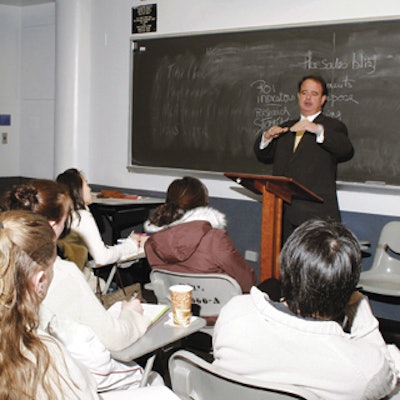
Rick Keating, director of marketing at the Crowne Plaza Hotel New York, spoke as a guest lecturer at NYU's "Sales and Marketing for Conferences and Events" class in February.
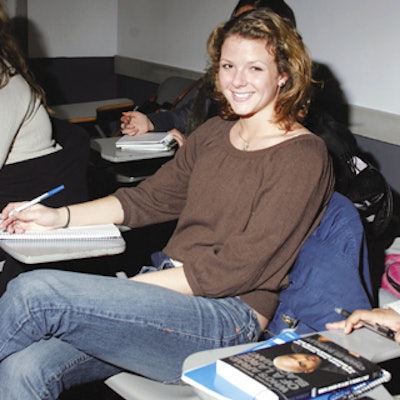
Lindsey Johnson is an NYU student who plans to graduate in May with a degree in tourism planning and development.


